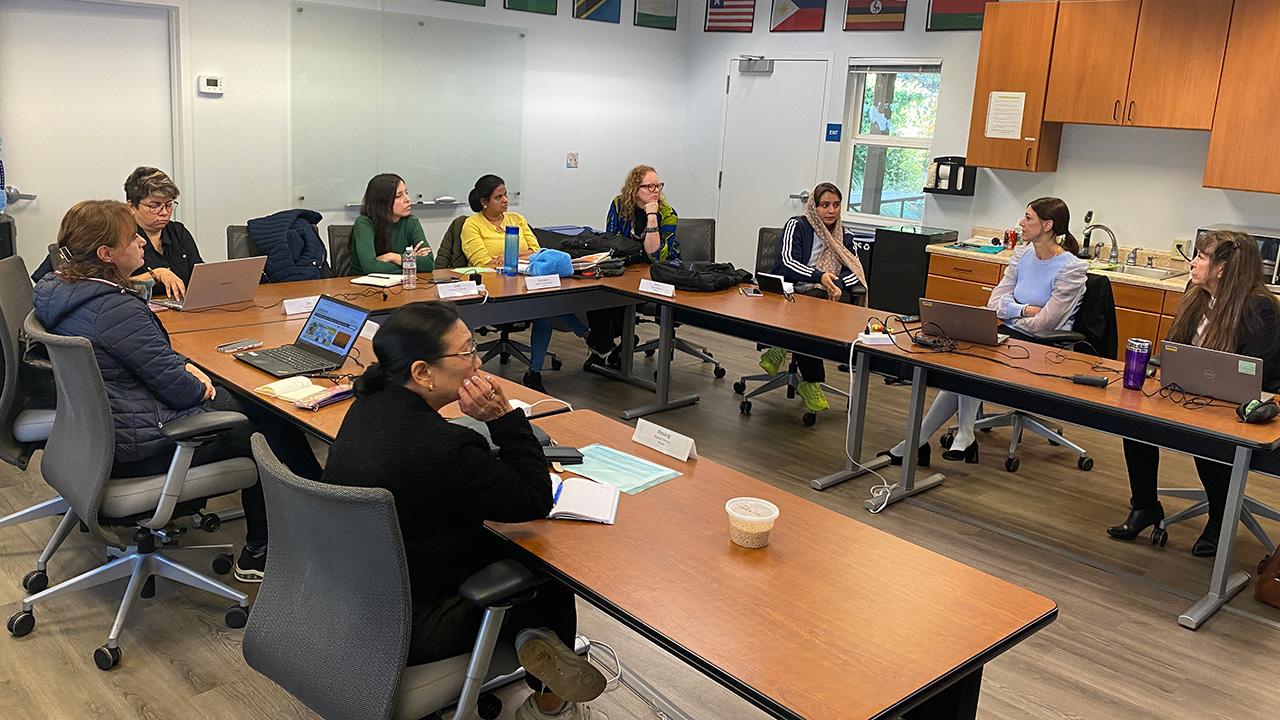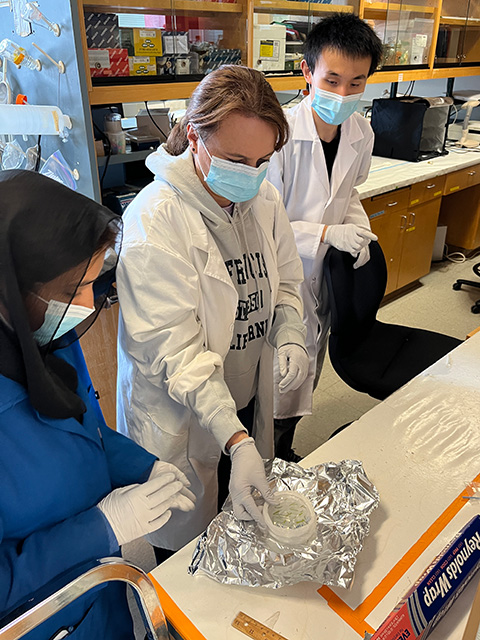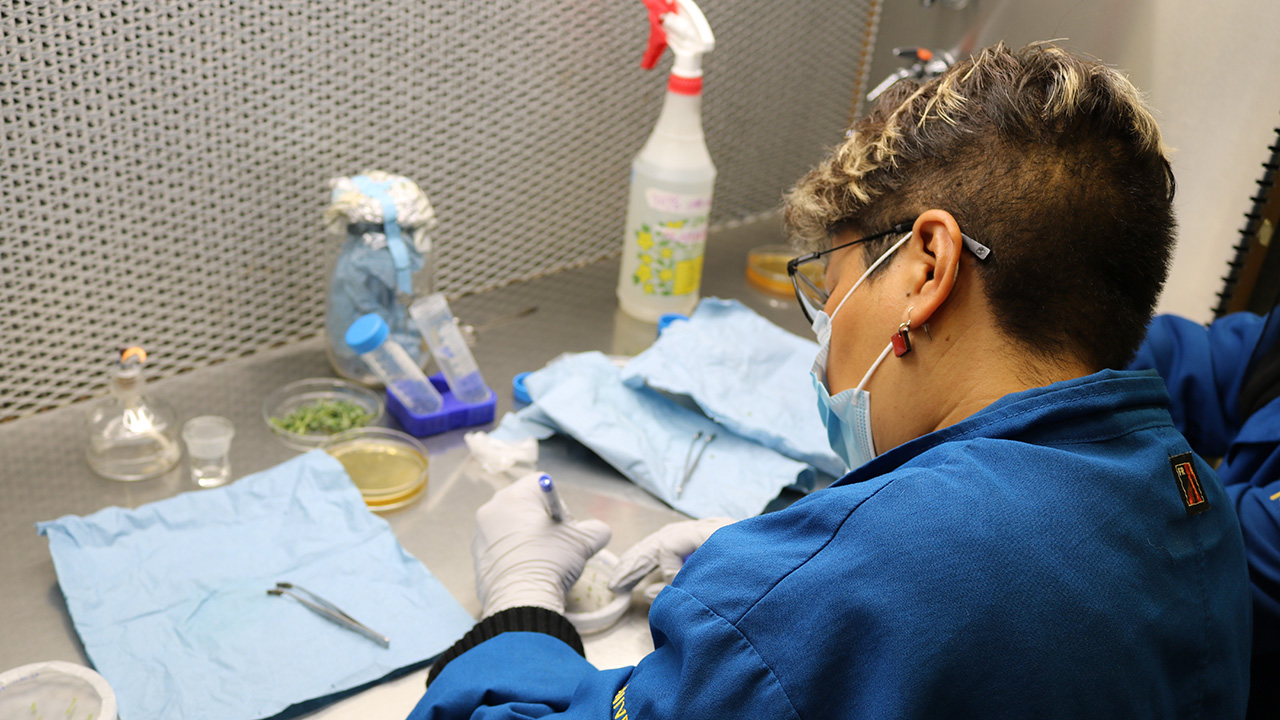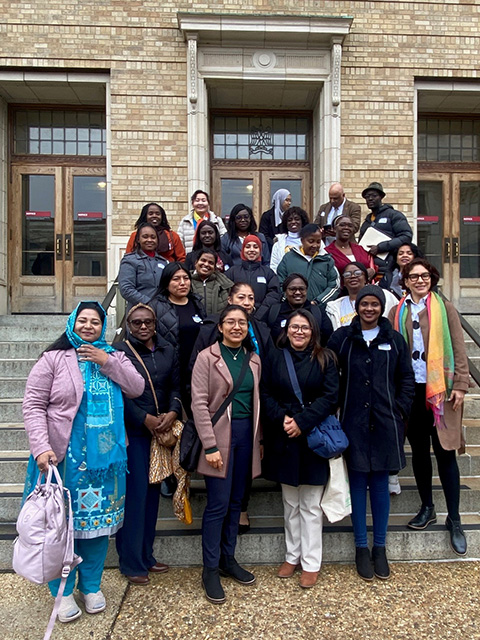
Women leaders come to UC Davis to improve international food systems
Beckles co-leads program funded through USDA

Six women from around the world, all leaders in their fields, have spent the fall quarter at UC Davis learning from researchers here and from one another. Soon, each will return to her country to improve food systems there and empower more women.
The leaders of the program are Diane Beckles of the Department of Plant Sciences and Nikki Grey Rutamu of the College of Agricultural and Natural Resources' Global Engagement office, along with faculty hosts across the college. The program is funded through a grant of $300,000 from the United States Department of Agriculture’s Scientific Exchange Program.
The program aims to help women scientists from different countries influence research, markets, policy and farm operations. The idea is that women with stronger connections, better technical and communications skills, improved leadership and knowledge from different fields can make bigger impacts on agricultural research and development in low- and middle-income countries.
“The women are outstanding professionals from Colombia, Pakistan, Jamaica, Bhutan and Mexico,” explained Beckles. “They are engaging in research while simultaneously learning about food systems in California and thinking about adapting and applying key principles in their home countries, while also considering the relevant socio-cultural, economic and political nuances.”
“We hope we can kick-start longer-term working relationships around specific scientific research projects and explore learning across cultures and disciplines, including fusing social science approaches into research to improve impact,” added Grey Rutamu, director of training programs and partnerships. In addition to the scientific exchange, participants explore key concepts in sustainable agriculture, climate-informed decision-making and the sustainable development goals set by the United Nations. They use principles of gender-aware learning, offered through the university's GenderUp program, to secure more equitable access to the benefits of innovation.
Over 12 weeks, in addition to leadership development, training included participating in graduate seminars focused on international agriculture development, laboratory research on gene editing, understanding pesticide regulation in California, exploring the International Climate Hub, visiting the Center for Land-Based Learning and farms in several California counties, meeting key officials at the USDA in Washington, D.C., and attending the World Food Prize Foundation in Des Moines, Iowa.

Participant comments: "Lead effectively in the future"
Three participants offered their thoughts when asked, "What is the most valuable thing you are getting out of this experience?"
Kesang Tshomo, advisor to the Department of Agriculture, Bhutan: “One of the most valuable things I learned from this program was that there are vast differences in culture, work, communication, expectations and resources here in the U.S. compared to our countries.
"Awareness, education and knowledge on where, how, when and who to connect with is most important. You must be proactive and use the links and resources to move forward.
"We will take back contacts and links with many new people, faculty we met, and possibilities of reconnecting through the emails if not physically.”
Sukkasini Thissaverasingan, College of Agriculture, Science and Education, Portland, Jamaica: “It has been challenging to interact with students, evaluate them and provide instruction online since the pandemic. Some of the conferences and seminars I attended taught me how to use technologies like murals, Top Hat, and iClicker to engage the students. It was also interesting to observe the different learning management systems that let students follow a discussion or assess a session they attended.
"The chance to practice being a resilient leader, offering constructive criticism, and keeping an external perspective is among the most beneficial aspects of taking the leadership training course. These skills will greatly enhance my ability to lead a team in the future.”

Tahira Saddique, deputy director of the Islamabad Food Authority, Pakistan: “Participating in the leadership training course provided an invaluable opportunity to develop resilience as a leader, deliver constructive feedback and maintain an external perspective. These skills will significantly strengthen my ability to lead a team effectively in the future.”
Greater collaboration in the future
The program will conclude with the UC Davis mentors making trips abroad to visit the participants in their own countries. Mentors hope to continue the work that has begun through further scientific exchange and longer-term research efforts. Fellows and mentors also are creating draft proposals to continue their engagement with UC Davis.
“The things we learn abroad can improve education at UC Davis and within the UC ANR system,” Grey Rutamu said.
The program meshes with multiple University of California efforts to promote food systems that are stronger, more efficient, and climate-resilient. The scholars attended the CA&ES Global Food Systems Ag Day which discussed how to rebuild systems to provide food that is nutritious, plentiful, affordable, diverse, and equitable.
In addition to Beckles, more people in the Department of Plant Sciences working with the participants include Amanda Crump, Christine Diepenbrock and Erin McGuire; plus and Whitney Brim-DeForest of UC Agriculture and Natural Resources. Important supporters include Louise Ferguson, Pam Ronald, Juliana Moura Bell, Beth Forrestel, Sarah McCullough, Joanna Regulska and Jolynn Shoemaker.
The program was managed by the CA&ES Global Engagement, which facilitates, supports, and collaborates with faculty across the college to develop meaningful international research, teaching, training exchanges and partnerships, through proposal development, program design, logistics, implementation, reporting, and more.
Through USDA's Foreign Agricultural Service, the grant was funded through the Scientific Exchange Program's initiative for Women in Sustainable Food Systems.
Media Resources
- Trina Kleist, UC Davis Department of Plant Sciences, tkleist@ucdavis.edu, (530) 754-6148 or (530) 601-6846
